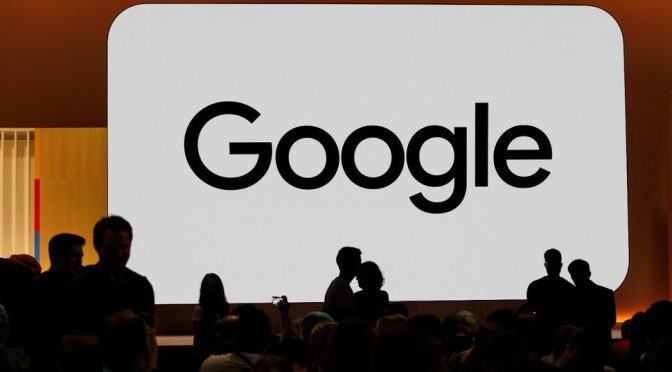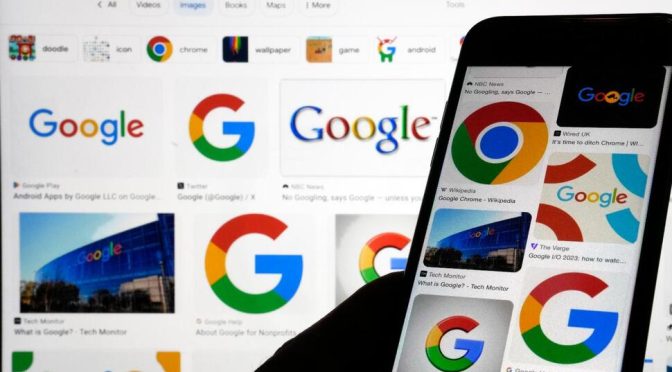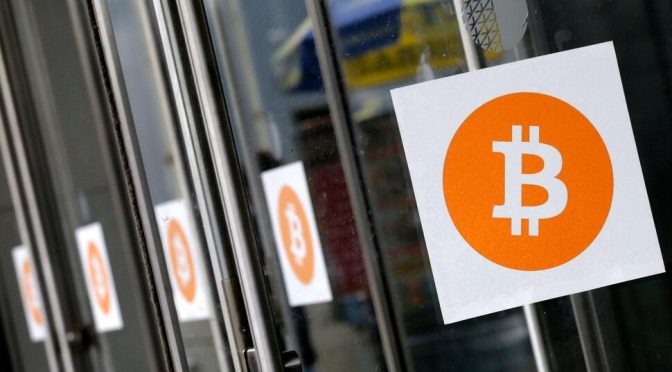Google’s digital ad sales grew steadily during the holiday season, but they couldn’t alleviate concerns among investors about whether its heavy investment in AI will deliver the expected returns.
Monthly Archives: January 2025
Google appeals a jury’s decision that labeled its Play Store an illegal monopoly, aiming to overturn the verdict.
On Monday, Google appealed to a three-judge panel, seeking to overturn a jury’s ruling that labeled its Android app store an illegal monopoly and prevent the penalties imposed by a federal judge to address the alleged misconduct.
Trump’s tariff threat caused a drop in crypto prices, including the value of his own meme coin.
Cryptocurrency prices slumped amid concerns of a potential trade war between the U.S. and its key trading partners, with popular digital assets and President Trump’s meme coin suffering significant losses.
Google’s holiday season ad sales saw growth, but they couldn’t calm investor fears about the underperformance of its AI ventures.
Google’s digital ad sales continued to show healthy growth during the holiday season, yet concerns about the future profitability of its significant investment in artificial intelligence (AI) remain a source of investor anxiety. Despite posting strong earnings in the final quarter of 2024, Google parent company Alphabet Inc. faces growing skepticism over whether its AI ventures will deliver the returns originally anticipated.
The company’s October-December results, released on Tuesday, revealed that Alphabet had earned $26.5 billion, or $2.15 per share, marking a 28% increase from the same period the previous year. Total revenue rose 12% year-over-year to reach $96.5 billion. While Alphabet’s earnings exceeded analyst expectations of $2.13 per share, its revenue fell slightly short of projections, as reported by FactSet Research.
A key concern, however, was the revenue growth from Google Cloud, a division closely tied to AI, which failed to meet analysts’ optimistic forecasts. This underperformance in a high-profile growth area led to a more than 8% decline in Alphabet’s stock price after the earnings release, reversing a recent rally that had driven the company’s shares to an all-time high earlier in the trading session.
“The reaction underscores concerns that rivals like Microsoft, with its partnership with OpenAI, are better positioned to capitalize on AI’s potential to generate revenue,” explained Jesse Cohen, an analyst with Investing.com.
In contrast to the cloud division’s disappointing performance, Google’s advertising business saw solid growth. The company reported an 11% increase in ad sales year-over-year, reaching $72.5 billion, which surpassed analyst expectations. Google’s integration of AI-generated content in its search results, which provides users with more immediate information, has been cited as a contributing factor in driving this ad revenue growth.
Jim Yu, CEO of BrightEdge, a company specializing in search engine optimization, stated, “The early signs suggest that AI is working for Google. It allows Google to keep more of the digital experience within its search engine, ensuring that when users are sent to other websites, they are further along in their journey. This makes those visitors more valuable to advertisers.”
However, despite these positive trends in advertising, Google’s substantial investments in AI have raised concerns among some investors. While AI holds great promise, a recent breakthrough by the Chinese startup DeepSeek, which successfully deployed similar technology at a fraction of the cost, has further fueled doubts about Google’s ability to maintain its competitive edge in this space. Alphabet has indicated that its AI expansion will significantly increase its capital expenditure, from $60 billion last year to an expected $75 billion this year.
During a conference call with investors, CEO Sundar Pichai sought to reassure stakeholders by emphasizing that AI is already proving to be a valuable asset for Google. “The company is in a great rhythm and cadence, building, testing, and launching products faster than ever before,” Pichai said, highlighting the growing impact of AI on the company’s operations.
In addition to its AI-related challenges, Alphabet is contending with regulatory issues. A federal judge ruled last year that Google’s search engine constitutes an illegal monopoly, which could lead to potential legal and structural changes. The ruling has sparked discussions about the possibility of forcing Google to divest its Chrome web browser, and court hearings on this matter are scheduled to begin in April, with a decision expected by autumn.
Furthermore, the company is facing pressure to dismantle the protections it has around its Play Store for Android apps. This decision is currently on hold as Google appeals the ruling. Alphabet is also awaiting a decision in a high-stakes antitrust trial in Virginia, which centers on the technology behind its digital advertising network.
As Google navigates these multiple challenges—AI investment questions, regulatory scrutiny, and the evolving competitive landscape—it remains to be seen whether its strategies will succeed in driving sustainable growth and maintaining investor confidence.
Google appeals a jury’s decision that labeled its Play Store an illegal monopoly, aiming to overturn the verdict
Google appeared before the appeals court on Monday, aiming to convince a three-judge panel to overturn a jury’s decision that declared its Android app store an illegal monopoly. The company also seeks to block penalties imposed by a federal judge to curb its monopolistic behavior. The case, brought by video game maker Epic Games, accuses Google of abusing its dominant position in the Android app market through the Play Store. Epic argues that both the verdict and the penalties should be upheld to promote innovation and reduce prices for consumers.
In a nearly hour-long presentation at the Ninth Circuit Court of Appeals in San Francisco, Google lawyer Jessica Ellsworth explained why the company believes U.S. District Judge James Donato misdefined the market during the 2023 trial. Ellsworth argued that the market in question should have been defined similarly to how it was in a 2021 antitrust case involving Apple. She further claimed that the case should not have been decided by a jury at all, as Google had requested a judge to decide the matter, unlike the Apple trial, which was also heard by a jury.
Epic Games, known for its popular game Fortnite, filed separate antitrust lawsuits against Apple and Google in August 2020. While the Apple case resulted in a ruling largely in favor of Apple, Google’s case went before a jury in San Francisco. Ellsworth told the appeals court that Judge Donato allowed Epic to alter the market definition by excluding Apple’s app store as a competitor, a move that ultimately led to the jury’s verdict against Google.
“You can’t just lose an issue that was fully litigated the first time and pretend it didn’t happen,” Ellsworth argued. She emphasized that the competition between Google and Apple, which both control the operating systems for nearly all smartphones worldwide, is significant enough to prevent either company from abusing its market position.
However, the appeals judges appeared to see differences between the Apple and Google cases. Judge Danielle J. Forrest noted the contrast between Apple’s “walled garden” model, where software and hardware are bundled together, and Google’s model, where Android is licensed to a variety of smartphone manufacturers. This distinction could justify a different market definition in the two cases.
Judge Gabriel Sanchez also questioned whether Google could be considered a monopolist in its own ecosystem, even if it competes with Apple in the smartphone operating system market. “Even if Google vigorously competes with Apple, that doesn’t mean it can’t create a different ecosystem where it’s a monopolist,” Sanchez remarked.
Epic’s attorney, Gary Bornstein, countered that Google’s arguments were a desperate attempt to preserve a system that benefits the company by charging high commissions—ranging from 15% to 30%—on in-app purchases through the Play Store. Bornstein emphasized that the penalties imposed by Judge Donato, which were put on hold while Google pursues its appeal, would bring about changes intended to foster competition. These changes could include allowing competitors to access the Play Store’s vast library of over 2 million apps, potentially leading to lower commission rates for app developers.
The appeals court has not provided a timeline for issuing a ruling in the case, but it typically takes several months before a decision is made.
In addition to this ongoing legal battle, Google is facing further potential penalties. A federal judge recently ruled that Google’s search engine constitutes an illegal monopoly, which could lead to the company being forced to sell its Chrome web browser. Google’s ongoing legal challenges could have significant implications for the company’s future operations.
During the two-hour hearing, Bornstein reminded the panel that the bar for overturning a jury’s verdict should be set high. “The benefit of the doubt does not go to the wrongdoer,” he said. The judges also expressed concerns about Donato’s decision to maintain a jury trial after Google reached settlements in related cases involving U.S. attorneys general and other developers. At one point, Judge Forrest suggested the possibility of declaring the verdict as advisory and sending the case back to Donato for further review, noting that the jury’s decision was based on just a few questions and a brief market definition.
Bornstein argued against this approach, urging the court not to give Google more time to profit from its alleged monopolistic conduct. The appeals court’s ruling on the case will have significant implications not only for Google but also for the broader tech industry and its approach to app stores and digital markets.
Trump’s tariff threat caused a drop in crypto prices, including the value of his own meme coin
Cryptocurrency prices were significantly impacted by the looming threat of a trade war between the U.S. and its major trading partners, with both well-established digital assets and even President Donald Trump’s own meme coin taking steep losses.
Bitcoin, the most popular cryptocurrency, experienced a drop from around $105,000 shortly after Trump announced plans on Saturday to impose large tariffs on goods from Canada, Mexico, and China. The price fell to approximately $92,000 by Sunday night but recovered to over $100,000 by Monday afternoon after Trump paused the tariffs on Mexican goods. A similar halt was later announced for Canadian goods.
While Bitcoin demonstrated more resilience compared to other cryptocurrencies, the wider market saw significant declines. Ethereum, Dogecoin, and several other popular digital assets dropped sharply. Trump’s meme coin, created ahead of his second inauguration, was trading around $19 on Monday—down roughly 75% from its all-time high shortly after its launch.
“These are riskier cryptos than Bitcoin,” said Garrick Hileman, an independent cryptocurrency analyst. “But it’s surprising how big the gap is.”
The market volatility was part of a broader global financial swing as Trump’s tariffs neared implementation. The former president had warned that Americans might feel “some pain” from the tariffs but claimed it would be “worth the price” to make America great again. He also mentioned that similar import taxes could soon apply to the European Union and possibly the United Kingdom. However, U.S. stock markets partially recovered after Mexico’s president announced a temporary reprieve on the tariffs.
Bitcoin, created in 2009 as an electronic form of currency independent of banks or governments, has seen its price movements increasingly mirror that of tech stocks in recent years, as the cryptocurrency moved from niche interest to mainstream acceptance.
Nic Carter, a partner at Castle Island Ventures, explained, “The flip side of this asset gaining respectability and finding a role in institutional portfolios is that it is now exposed to liquidity constraints faced by larger investors. We wanted Bitcoin to become a global macro asset class—and now it is.”
Meme coins, which often start as jokes without inherent value, can experience wild price swings if there’s enough hype and interest from investors. While Trump had been a crypto skeptic in the past, he has since embraced digital assets, both as a wealth source and a government policy priority. The former president has expressed his desire to make the U.S. the world leader in cryptocurrency and appointed crypto-friendly figures to key positions in government.
Since Trump’s election, cryptocurrencies have seen a surge in value, with Bitcoin still trading near its all-time high of $109,000. Despite recent turbulence, the digital asset continues to demonstrate significant market relevance.


